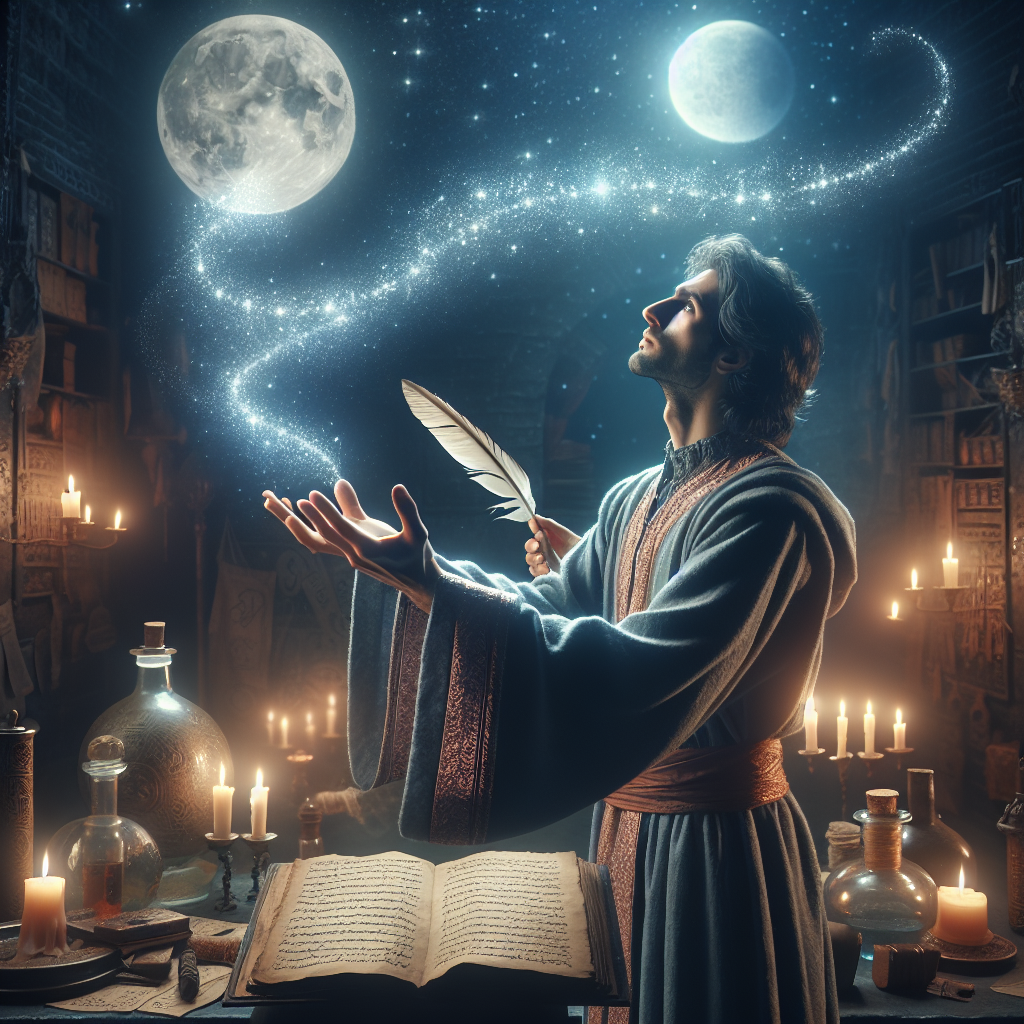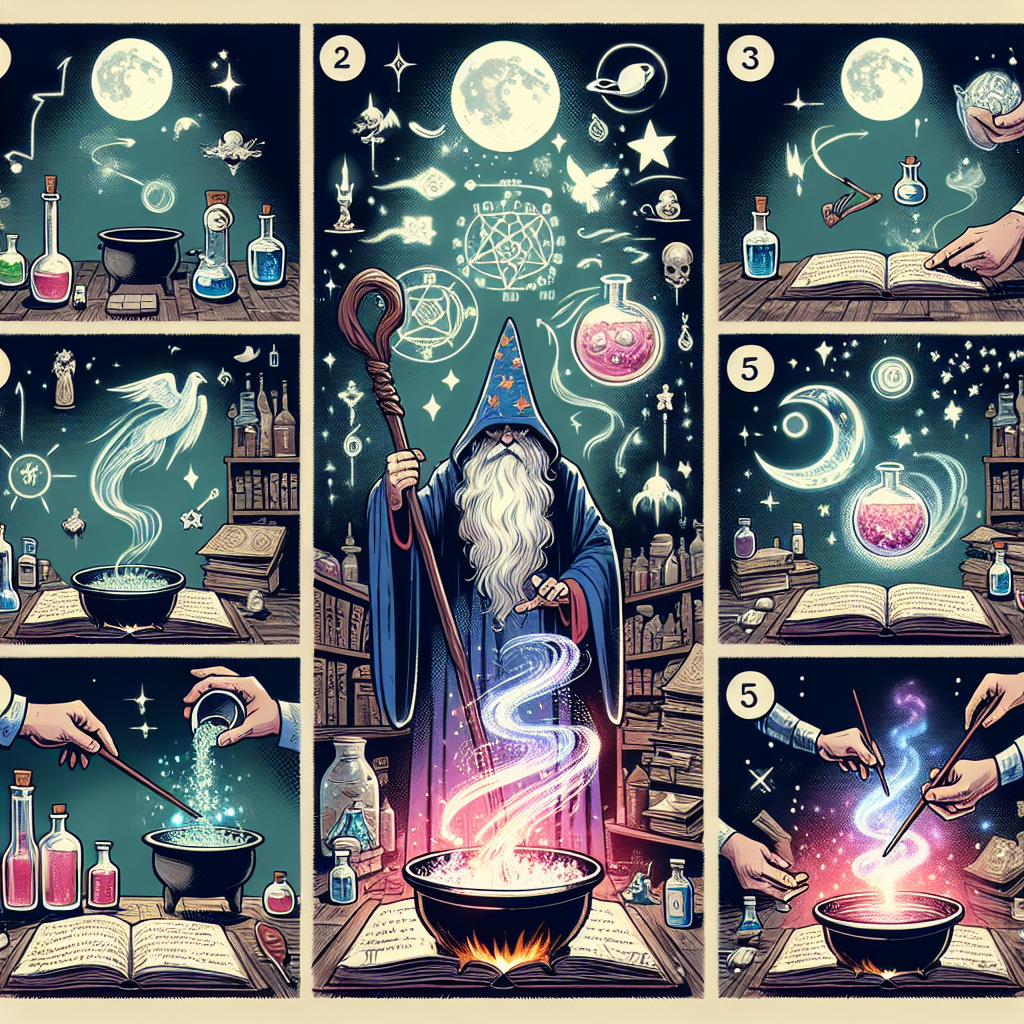As an Amazon Associate I earn from qualifying purchases.

In the annals of human history, the practice of spellcasting has been both celebrated and feared, anchored in the belief that humans can tap into mystical forces to influence the world around them. From the ancient Egyptian magicians to medieval witches and modern-day Wiccans, the art of casting spells has been carefully honed and guarded across millennia. Though the processes and principles for spellcasting vary widely among different cultures and traditions, the common thread lies in the intent to invoke supernatural power to achieve a specific goal.
To embark on spellcasting, it’s crucial to understand the foundational elements that many traditions agree upon. A spell often requires several components: a clear intention, the right words or incantations, and sometimes a physical object to act as a focus or conduit for the desired magical energy. The choice of timing, too, is important; many practitioners believe that spells are more potent when cast during certain phases of the moon or at specific times of the day or year.
Creating a space conducive to magic is also an essential step in casting a spell. This may involve setting up an altar with items that have personal significance or are aligned with the purpose of the spell. Lighting candles, burning incense, or drawing a protective circle are also common rituals believed to enhance the caster’s focus and keep away negative energies. Every detail, from the direction one faces to the colors and symbols used, is selected with the intention of aligning the spellcaster with the forces that can bring about the desired change.
Perhaps one of the most enthralling aspects of spellcasting is the power of the spoken word. Chants, rhymes, and affirmations are carefully crafted to resonate with the caster’s purpose, and the repetition of these incantations is thought to raise energy and impress the caster’s will upon the fabric of reality. The belief in the vibration and frequency of words is so potent that, according to some magical practitioners, a single misplaced syllable can drastically alter the effectiveness of a spell.
Despite the mystical nature of spells, modern adherents often emphasize the psychological benefits of spellcasting. Consistency and belief play significant roles in the process, with the argument that casting spells can foster a positive mindset that helps individuals pursue their goals with more conviction. This idea is bolstered by a compelling statistic: studies in cognitive psychology suggest that performing rituals can significantly reduce anxiety and improve performance in stressful situations.
In conclusion, although this text does not provide a direct guide on how to cast a foolproof spell, it outlines the rich tapestry of belief and ritual that has made spellcasting a persistent phenomenon. It demonstrates the intricate blend of tradition, intention, and psychological factors that continue to captivate those who seek to harness the power of the arcane. Whether viewed as a metaphysical practice or as a psychological toolkit, the art of spellcasting remains a fascinating facet of human culture, enduring in various forms across the ages.
html
What Are the Steps to Successfully Cast a Spell? A Comprehensive Guide
In the mystical realm of spellcasting, success hinges on understanding not just the incantations but also the foundational principles that govern magical practices. Casting a spell involves a precise blend of intention, energy manipulation, symbolic actions, and often, spoken words. The advantage of mastering spellcasting is the empowerment it brings, allowing an individual to influence their surroundings, attract desires, or manifest change. This comprehensive guide will expound on the necessary preparations—such as choosing the right time, gathering appropriate materials, and entering a suitable state of mind—as well as the follow-through required to seal the spell’s effectiveness. Embark on this enchanting journey with us as we delve into the secrets of foolproof spellcasting, ensuring your mystical endeavors are met with success.
Understanding the Basics of Spell Casting
When exploring how to cast a spell, it’s imperative to begin with a solid understanding of the principles underlying most magical practices. These basic tenets require that you have a clear intent, focus your energy, and adhere to the ethical and spiritual laws that govern the realm of magic.
Setting Your Intent
The success of a spell hinges on the clarity and strength of your intention. Before undertaking any spell, spend time meditating on your goals. Visualize your desired outcome with as much detail and emotion as possible. A precise intent forms the bedrock of an effective spell, directing the energy you’ll raise to manifest your will.
Harnessing the Necessary Materials
In the realm of spellcasting, various tools and materials are often used to symbolize your intent and concentrate your energy. These can include herbs, candles, crystals, oils, and written words. The more these materials resonate with your intention, the more potent your spell will be.
Creating a Ritual Space
Designating a sacred space for your spellwork is critical. This area should be clean, quiet, and free from distractions. You may wish to cast a circle, a protective boundary that keeps out unwanted energies and keeps your energy contained within. Within your circle or space, you can arrange your materials in a way that aligns with your tradition or personal preferences.
Raising and Directing Energy
With your intention set and materials assembled, you’re ready to raise energy. This energy comes from within and around you, and can be raised through various means such as meditation, chanting, dancing, or drumming. As the energy peaks, channel it into your materials, visualizing it blending with your intent and moving toward your goal.
Releasing and Grounding
After sending your intention out into the universe through your spell, it’s important to release any excess energy you’ve raised. Not doing so can leave you feeling jittery or unbalanced. You can release energy by grounding yourself – visualize it flowing out of you and into the earth, like water soaking into soil.
Following Magical Correspondences
To enhance the potency of your spell, work with the correspondences that align with your intent. This might involve choosing the right day of the week, phase of the moon, colors, or even hour of the day to perform your spell. These correspondences amplify your focus and add a layer of symbolic meaning, reinforcing the power of your ritual.
Binding the Spell
Once everything comes together, you’ll need to seal or “bind” the spell. This often involves a physical action like tying a knot, speaking a final affirmation, or blowing out a candle. Binding symbolizes the completion of the spell and your commitment to its purpose.
Document Everything
Keep a detailed record of your spell in a journal or a Book of Shadows. Note down the date, time, materials used, your intention, and how you felt before, during, and after the spell. These notes will be invaluable for refining your practice and tracking the effectiveness of your work.
Maintaining Patience and Openness
After casting a spell, give it time to work. Magic often moves in unexpected ways and doesn’t always conform to our timeline. Stay open to signs and be patient, while also taking practical steps toward your goal in the mundane world.
Ethical Considerations
Ethics in spellcasting cannot be overstated. Avoid casting spells that manipulate others or infringe on their free will. What you send out can come back to you, a belief that’s encapsulated in the Wiccan Rede’s advisory to harm none or in similar karmic laws found in various traditions.
According to a survey conducted by the Pew Research Center, nearly 60% of Americans hold at least one New Age belief, such as belief in psychic ability or spiritual energy in physical objects. This statistic demonstrates the prevalence of magical thinking and the potential social embrace of practices like spellcasting in the modern era.
1. Is casting a spell real, or is it just superstition?
Answer: The belief in and the practice of spell casting vary widely and are influenced by cultural, spiritual, and personal beliefs. Some view it as a real manifestation of one’s intention and energy, while others consider it a form of superstition or symbolic practice.
2. Do I need any special tools to cast a spell?
Answer: Many traditions do suggest using specific tools for casting spells, such as candles, wands, or crystals. However, the necessity of such tools can vary depending on the individual’s practice, and some may cast spells using just their focus and intention.
3. Can anyone learn to cast a spell, or is it only for certain people?
Answer: Most practices that involve spell casting believe that anyone can learn to cast spells, although it may require study, practice, and a deep understanding of the intentions and energies involved.
4. Are there any risks involved in casting spells?
Answer: As with any practice involving energies and intentions, there can be risks if not done responsibly. It’s important to be clear on your intentions, and aware of the potential impact on yourself and others.
5. How can I ensure that my spell is successful?
Answer: Success in spell casting is said to rely on a clear intention, a focused mind, and often a connection with natural elements or energies. Belief in one’s own abilities and the spell’s purpose is also considered crucial.
6. Can spells cause harm to someone else?
Answer: Ethical considerations play a significant role in spell casting. Many traditions abide by the rule of harm none or similar ethical guidelines to avoid causing harm.
7. How long does it take to see the results of a spell?
Answer: The manifestation time of a spell’s results can vary greatly; it can be almost immediate or take an extended period, depending on the nature of the spell and external factors.
8. Do spells work the same for everyone?
Answer: No, the effectiveness of spells can differ from person to person based on individual belief, intent, and the level of practice and skill in casting spells.
9. Is there a best time or place to cast a spell?
Answer: Many practitioners believe that the time and place can enhance a spell, such as casting during specific moon phases or in a peaceful, undisturbed setting. However, intent and personal belief are always key factors.
10. Can I undo a spell once it has been cast?
Answer: Some traditions assert that spells can be undone or counteracted by casting a “reversal” or undoing spell, though this may require additional knowledge and practice.

Conclusion
The journey into spellcasting is one filled with self-discovery, discipline, and the harmonization of one’s inner will with the energies of the world. We’ve covered the essential steps to successful spellcasting, from setting your intention clearly and creating a focused space to the importance of gathering the right materials and conducting your ritual with precision. Emphasizing visualization and emotional investment in the outcome ensures that your spell is charged with the necessary power. Additionally, aligning your work with the phases of the moon, the days of the week, and natural elements can enhance the potency and specificity of your magical workings.
Remaining aware of the ethical considerations is paramount to avoid unintended consequences and ensure that your practice respects the free will of others. Consistent practice and maintaining a record of your spells in a grimoire or book of shadows contribute to honing your skills and understanding the nuances of your craft. Understand that patience is key, as results may manifest in unexpected ways and require time to align with your desires. By integrating these insights and principles into your practice, your path in spellcasting will be imbued with wisdom, effectiveness, and the foolproof mastery of the magical arts.
Amazon and the Amazon logo are trademarks of Amazon.com, Inc, or its affiliates.
Continue Your Magical Journey
Free Witchcraft Starter Kit
Get 6 free printable PDFs: grimoire pages, moon calendar, spells, crystals, herbs, and tarot journal.
We respect your privacy. Unsubscribe anytime.
Enhance Your Practice
As an Amazon Associate, I earn from qualifying purchases.

